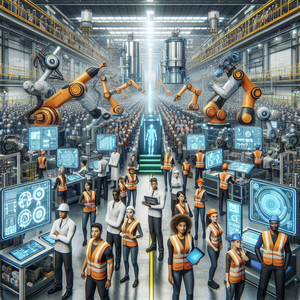The Future of Quality Control Engineering with AI

AI is playing a pivotal role in transforming quality control methodologies through technologies such as machine learning, computer vision, and predictive analytics. These advancements enable quality control engineers to analyze vast datasets in real-time, leading to improved decision-making and product quality. For instance, machine learning algorithms can scrutinize production data to identify patterns indicative of potential quality issues before they manifest. By leveraging historical data, these algorithms can forecast machine failures or predict when a product might not meet quality standards. This proactive stance minimizes waste, reduces downtime, and enhances overall operational efficiency.
Innovative Tools and Techniques
AI has given rise to several innovative tools that streamline quality control processes: 1. Automated Inspection Systems: These systems utilize computer vision technology to inspect products with an accuracy and speed that surpasses conventional manual inspections. They can identify defects or deviations from specifications in real-time, facilitating immediate corrective actions. 2. Predictive Quality Analytics: By combining AI with data analytics, quality control engineers can create predictive models that evaluate product quality based on multiple parameters. This capability allows for adjustments in the manufacturing process, mitigating the risk of defects before they occur. 3. Robotic Process Automation (RPA): RPA automates repetitive quality control tasks, such as documentation and reporting. This automation enables engineers to focus on strategic initiatives, thereby increasing productivity and enhancing the accuracy of quality assessments.
Benefits of AI in Quality Control Engineering
The integration of AI into quality control engineering presents numerous advantages: - Enhanced Accuracy: AI-driven inspections substantially reduce human error, resulting in higher accuracy in quality assessments. This precision is particularly crucial in industries where safety and compliance are non-negotiable. - Cost Efficiency: By catching defects early in the production process, AI can significantly reduce costs associated with rework, recalls, and customer dissatisfaction. - Improved Customer Satisfaction: Enhanced quality control measures enable manufacturers to deliver products that meet or exceed customer expectations, thereby fostering brand loyalty and positive reviews. - Data-Driven Decision Making: AI technologies provide engineers with insights derived from comprehensive data analysis, facilitating more informed and strategic decisions regarding quality assurance practices.
Real-World Examples
Several leading companies are already harnessing AI to bolster their quality control processes. For instance, Tesla employs AI-driven quality inspection systems in its manufacturing plants, enabling real-time detection of defects in its electric vehicles. Similarly, Siemens utilizes predictive analytics to monitor its production lines, identifying potential quality issues before they escalate into significant problems.
Career Considerations for Quality Control Engineers
As the field of quality control engineering evolves, professionals in this sector must consider several opportunities for career growth and development: 1. Embrace Continuous Learning: Staying updated with the latest AI technologies and quality control methodologies is critical for success. Engineers should seek training and certification programs that enhance their skills in data analytics, machine learning, and automation. 2. Adapt to Technological Changes: The increasing reliance on AI necessitates a shift in skill sets. Quality control engineers should be prepared to adapt to new technologies and integrate them into their workflows. 3. Focus on Systematic Thinking: A systematic approach to problem-solving will help engineers navigate complex quality control challenges more effectively. 4. Commit to Zero-Defect Initiatives: A commitment to achieving zero defects can drive engineers to innovate and continually improve quality control processes. 5. Develop Interdisciplinary Skills: Collaboration with professionals across engineering, data science, and manufacturing can lead to more holistic approaches to quality assurance.
The future of quality control engineering is inextricably linked to advancements in artificial intelligence. As these technologies continue to develop, they empower quality control engineers to adopt more efficient, accurate, and proactive approaches to quality assurance. This transition from traditional methods to AI-driven solutions not only yields significant benefits for manufacturers through cost savings and improved operational efficiency but also enhances the overall customer experience. As industries increasingly embrace this technological shift, quality control engineers will play a crucial role in shaping the future of product quality and safety, solidifying their value in an ever-complex manufacturing landscape.
AI Quality Control Engineer
Tesla, Siemens, General Electric
Core Responsibilities
Develop and implement AI-driven algorithms for real-time quality inspections.
Collaborate with manufacturing teams to integrate machine learning models into production processes.
Analyze data from automated inspection systems to identify trends and potential quality issues.
Required Skills
Proficiency in machine learning frameworks (e.g., TensorFlow, PyTorch).
Strong programming skills in Python or R for data analysis and algorithm development.
Knowledge of computer vision techniques and tools.
Quality Assurance Data Analyst
Procter & Gamble, Pfizer, Johnson & Johnson
Core Responsibilities
Utilize predictive analytics to assess product quality and identify areas for improvement.
Generate reports on quality metrics and present findings to stakeholders.
Collaborate with cross-functional teams to design experiments and analyze outcomes.
Required Skills
Expertise in statistical analysis software (e.g., R, SAS, SPSS).
Strong understanding of quality control methodologies (e.g., Six Sigma).
Excellent communication skills for presenting complex data insights.
Automation Quality Control Specialist
Amazon, Coca-Cola, Unilever
Core Responsibilities
Design and implement robotic process automation (RPA) solutions for quality control tasks.
Monitor automated systems for performance and compliance with quality standards.
Train staff on the use of automated tools and processes within quality assurance.
Required Skills
Familiarity with RPA tools (e.g., UiPath, Automation Anywhere).
Strong problem-solving skills and attention to detail.
Ability to work collaboratively with IT and engineering teams.
Quality Control Systems Engineer
Boeing, Lockheed Martin, Honeywell
Core Responsibilities
Develop and maintain quality management systems that comply with industry regulations.
Implement quality control processes and tools to monitor production quality.
Conduct audits and assessments to ensure adherence to quality standards.
Required Skills
Knowledge of ISO 9001 standards and quality management best practices.
Experience with quality assurance software and databases.
Strong analytical and organizational skills.
Continuous Improvement Quality Engineer
Ford Motor Company, IBM, Caterpillar
Core Responsibilities
Drive continuous improvement initiatives using data-driven methodologies.
Lead root cause analysis sessions to address quality issues and implement corrective actions.
Collaborate with teams to enhance product design and manufacturing processes.
Required Skills
Certification in Six Sigma or Lean methodologies.
Strong project management skills and experience leading cross-functional teams.
Proficiency in quality tools such as FMEA, SPC, and control charts.


